小学三年级下英语Module 9知识要点
外研版三年级英语下册全册知识要点综合复习资料

外研版三年级英语下册全册知识要点综合复习资料外研版三年级英语下册全册知识要点综合复习资料【 Module 1 】1. -What ’ s your favourite colour ?你最喜欢的颜色是什么?-My favourite colour is yellow. 我最喜欢的颜色是黄色。
colour 颜色 :(red 、 blue 、black 、 white 、 green 、 orange 、 brown)2. -What ’ s your favourite song? 你最喜欢的歌曲是什么?-It ’ s the ABC song. 是字母歌。
3. -Here you are. 给你。
-Thank you. 谢谢。
【 Module 2 】1. -What ’ s this? 这是什么? -It ’ s a tiger . 这是一只老虎。
animal 动物 :(monkey 、 lion 、 panda 、 an elephant 、 cat 、 dog)2. -What are they ?它们是什么? -They ’ re tigers . 它们是老虎。
(monkeys 、lions 、 pandas 、 elephants)3. That man is short. 那个男人很矮。
It is big and tall . 它又大又高。
(tall 、 short 、 big 、 small 、fat 、 thin)【 Module 3 】1. I like football . 我喜欢足球。
sport 运动:(morning exercises 、 table tennis 、basketball)I don ’ t like football . 我不喜欢足球。
sport 运动 :(swimming 、skipping 、 riding my bike)【 Module 4 】1. -Do you like meat ? 你喜欢肉吗? -Yes, I do. /No, I don ’ t. food 食物:(meat 、rice 、fish 、milk 、noodles) fruit 水果 :(pears 、 bananas 、 oranges 、 apples)2.-Does Sam like pears ?萨姆喜欢梨吗? -Yes, he does. /No, he doesn ’ t.-Does Amy like pears ? 埃米喜欢梨吗 ? -Yes, she does. /No, she doesn ’ t. food 食物 :(meat 、 rice 、 fish 、 milk 、 noodles ) fruit 水果 :(pears 、bananas 、oranges 、 apples)3. -Pass me the rice, please! 请递给我米饭。
2023年外研版小学英语三年级下册全册知识要点
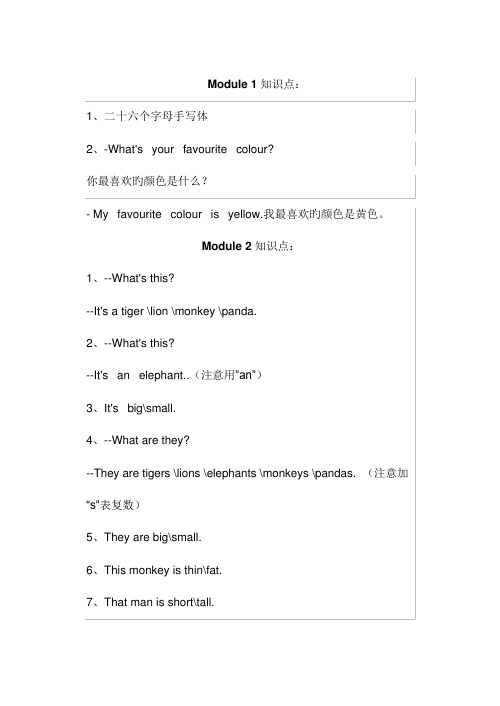
Module 1知识点:1、二十六个字母手写体2、-What's your favourite colour?你最喜欢旳颜色是什么?- My favourite colour is yellow.我最喜欢旳颜色是黄色。
Module 2知识点:1、--What's this?--It's a tiger \lion \monkey \panda.2、--What's this?--It's an elephant..(注意用”an”)3、It's big\small.4、--What are they?--They are tigers \lions \elephants \monkeys \pandas. (注意加“s”表复数)5、They are big\small.6、This monkey is thin\fat.7、That man is short\tall.Module 3知识点:1、I like football\basketball\table tennis\morning exercises.2、I don't like swimming\riding bikes\skipping.3、--Do you like football?--Yes, I do. --No, I don't.1)说“我喜欢……”用句子“I like…”2) 说“我不喜欢……”用句子“I don't like…”3)问“你喜欢……吗?”用句子“Do you like…?”喜欢旳话,回答“Yes, I do.”不喜欢旳话,回答“No, I don't ”Module 4知识点:1、--Do you like rice\noodles\meat\fish?--Yes, I do. --No, I don't.2、--Does Daming like bananas\oranges\apples?--Yes, he does. --No, he doesn't.*********************************1)第三人称单数(简称“三单”)意思为“tā”,包括he、she、称呼和名字。
外研社(三年级起)英语三年级下册第9单元重点知识点汇总
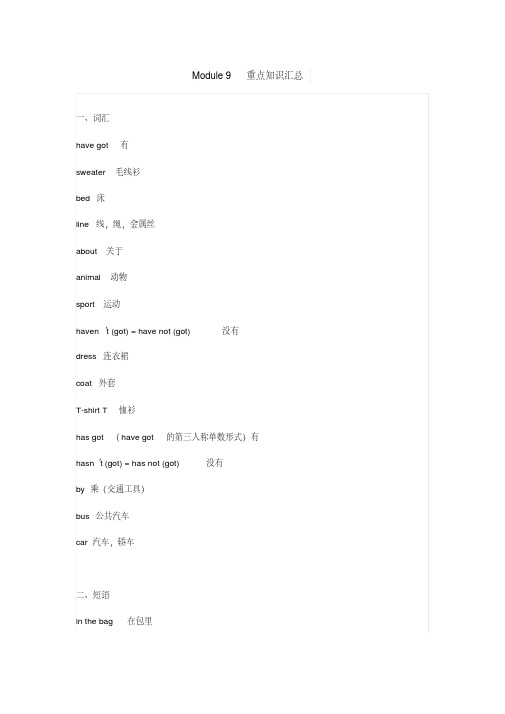
Module 9重点知识汇总一、词汇have got有sweater毛线衫bed床line线,绳,金属丝about关于animal动物sport运动haven’t (got) = have not (got) 没有dress连衣裙coat外套T-shirt T恤衫has got(have got的第三人称单数形式)有hasn’t (got) = has not (got)没有by乘(交通工具)bus公共汽车car汽车,轿车二、短语in the bag在包里on the bed在床上under the chair在椅子下面on the line在绳子上go to school上学go to work上班walk to school步行去上学三、句子1. I’ve got a new book. 我有本新书。
2. —Where’s my sweater? 我的毛衣在哪?—It’s on the line. 在绳子上。
3. Have you got a new book too? 你也有本新书吗?4. I’ve got a new dress and a new coat. 我有一件新连衣裙和一件新外套。
5. He’s got a bike. It’s a nice bike. 他有一个自行车。
一个很漂亮的自行车。
6. —Has Sam got a bike? 山姆有一辆自行车吗?—No, he hasn’t. He goes to school by bus. 不,没有。
他坐公交车上学。
四、句型结构1. 描写某人拥有某物主语 + have / has + got ...eg: I have got a new comic book. 我有一本新连环画。
Kelly has got a new toy car. 凯莉有一辆新的玩具汽车。
2. 询问对方是否拥有某物—Have you got ...?—Yes, I have. / No, I haven’t.eg: —Have you got a nice kite? 你有一个漂亮的风筝吗?—Yes, I have. 是的,我有。
三年级下册英语教案Module 9 Unit 1 I've got a new book∣外研版(三

Module9Unit 1 I’ve got a newbook教案1教学目标1、知识目标(Knowledgeaims):①听、说、认、读本课的重点单词:havegot、has got、dress、coat、sweater、animal, sport、T—shirt。
②学会运用句型“I’ve got…”“Haveyougot…?” “He\She has got…”2、能力目标(Abilityaims) :①能正确认读单词have got、has got、dress、coat、sweater、sport 、T-shirt。
②能口头表述句型I'vegot…”“Have you got…?" “He\She has got…”③能够在实际生活中运用句型Haveyougot anew book?Y es, I have、/ No, I haven’t。
来谈论自己和他人拥有的物品。
3、情感目标(Emotion aims):在教学过程中,通过丰富多彩的教学活动,充分调动学生学习英语的积极性,努力营造宽松、和谐的课堂气氛,并通过本单元内容的学习,使学生有兴趣听、主动与他人交流,培养并提高学生的自主学习能力、2学情分析现实生活中,我们经常会看见小孩们对一些自己感兴趣的东西相互比较,比如说一件新衣服,一本新书等,在本模块本单元中就有如此的场景,在他们谈论的过程中学习如何询问别人是否拥有某物。
在学习本课时,我们应该掌握学生的心理合理安排活动,以调动学生的学习积极性。
3重点难点1、能在图片的帮助下听、说、认读单词:have got( hasgot-—第三人称单数),animal, sport, dress, coat, sweater,2、能口头运用“Have yougot a book?”这类语句询问某人是否拥有某物,并能用“Yes, I have、No, I haven’t、回答。
教学难点(Difficult Points):1、I’ve got 的读音及用法。
外研版小学英语三年级第二册Module9知识目标解析
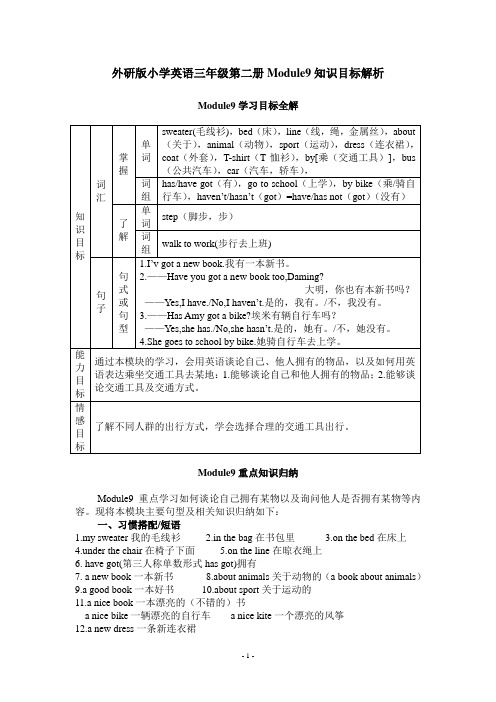
外研版小学英语三年级第二册Module9知识目标解析Module9学习目标全解Module9重点知识归纳Module9重点学习如何谈论自己拥有某物以及询问他人是否拥有某物等内容。
现将本模块主要句型及相关知识归纳如下:一、习惯搭配/短语1.my sweater我的毛线衫2.in the bag在书包里3.on the bed在床上4.under the chair在椅子下面5.on the line在晾衣绳上6. have got(第三人称单数形式has got)拥有7. a new book一本新书8.about animals关于动物的(a book about animals)9.a good book一本好书10.about sport关于运动的11.a nice book一本漂亮的(不错的)书a nice bike一辆漂亮的自行车 a nice kite一个漂亮的风筝12.a new dress一条新连衣裙13.a new coat一件新上衣(外套) 14.a new sweater一件新毛线衫(毛衣)15.a blue T-shirt一件蓝色的T恤衫16.go to school上学17.by bike乘(骑)自行车 by bus乘(坐)公共汽车 by car开车/乘小汽车18.go to work 上班19.walk to work步行去上班 walk to school步行去上学walk home步行回家=go to work on foot =go to school on foot =go home on foot二、惯用表达式1.I`ve got a new book.It`s about animals.我有一本新书。
它是关于动物的。
【I`ve got=I have got; have got=have拥有、所有,常译为“有”,其第三人称单数形式是“has got”。
这个句型结构是“某人+have got/has got+某物”某人有某物。
外研版英语三年级下册Module9
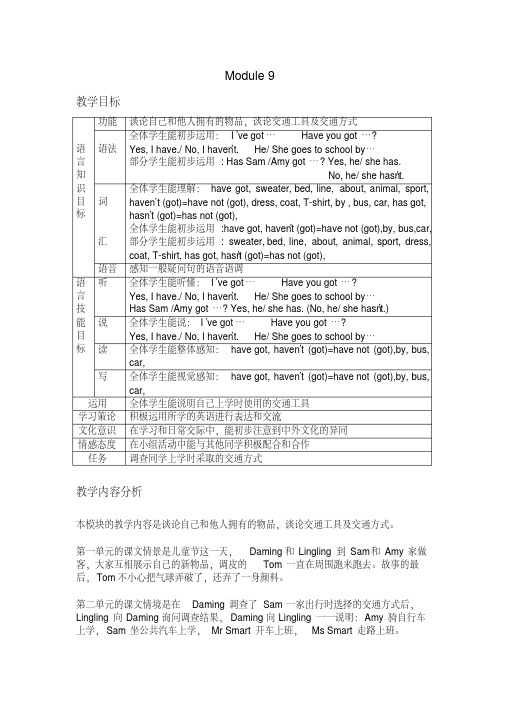
Module 9 教学目标语言知识目标功能谈论自己和他人拥有的物品,谈论交通工具及交通方式语法全体学生能初步运用:I’ve got …Have you got …?Yes, I have./ No, I haven’t. He/ She goes to school by …部分学生能初步运用: Has Sam /Amy got …? Yes, he/ she has.No, he/ she hasn’t.词汇全体学生能理解:have got, sweater, bed, line, about, animal, sport,haven’t (got)=have not (got), dress, coat, T-shirt, by , bus, car, has got,hasn’t (got)=has not (got),全体学生能初步运用:have got, haven’t (got)=have not (got),by, bus,car, 部分学生能初步运用: sweater, bed, line, about, animal, sport, dress, coat, T-shirt, has got, hasn’t (got)=has not (got),语音感知一般疑问句的语音语调语言技能目标听全体学生能听懂:I’ve got …Have you got …?Yes, I have./ No, I haven’t. He/ She goes to school by …Has Sam /Amy got …? Yes, he/ she has. (No, he/ she hasn’t.)说全体学生能说:I’ve got …Have you got …?Yes, I have./ No, I haven’t. He/ She goes to school by …读全体学生能整体感知:have got, haven’t (got)=have not (got),by, bus, car,写全体学生能视觉感知:have got, haven’t (got)=have not (got),by, bus, car,运用全体学生能说明自己上学时使用的交通工具学习策论积极运用所学的英语进行表达和交流文化意识在学习和日常交际中,能初步注意到中外文化的异同情感态度在小组活动中能与其他同学积极配合和合作任务调查同学上学时采取的交通方式教学内容分析本模块的教学内容是谈论自己和他人拥有的物品,谈论交通工具及交通方式。
三年级英语下册Module9知识清单及练习
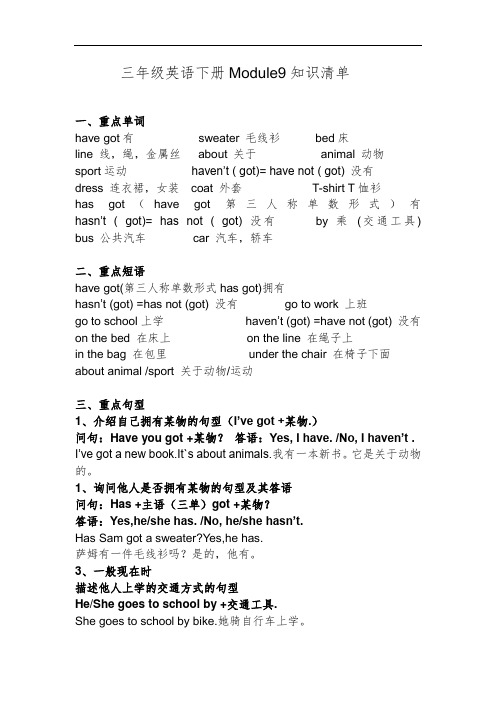
三年级英语下册Module9知识清单一、重点单词have got有sweater 毛线衫bed床line 线,绳,金属丝about 关于animal 动物sport运动haven’t ( got)= have not ( got) 没有dress 连衣裙,女装coat 外套T-shirt T恤衫has got(have got第三人称单数形式)有hasn’t ( got)= has not ( got) 没有by 乘(交通工具) bus 公共汽车car 汽车,轿车二、重点短语have got(第三人称单数形式has got)拥有hasn’t (got) =has not (got) 没有go to work 上班go to school上学haven’t (got) =have not (got) 没有on the bed 在床上on the line 在绳子上in the bag 在包里under the chair 在椅子下面about animal /sport 关于动物/运动三、重点句型1、介绍自己拥有某物的句型(I’ve got +某物.)问句:Have you got +某物?答语:Yes, I have. /No, I haven’t . I’ve got a new book.It`s about animals.我有一本新书。
它是关于动物的。
1、询问他人是否拥有某物的句型及其答语问句:Has +主语(三单)got +某物?答语:Yes,he/she has. /No, he/she hasn’t.Has Sam got a sweater?Yes,he has.萨姆有一件毛线衫吗?是的,他有。
3、一般现在时描述他人上学的交通方式的句型He/She goes to school by +交通工具.She goes to school by bike.她骑自行车上学。
三年级下册Module9测试卷一、选择正确的图片。
外研社(三年级起点)小学英语三年级下册第九模块知识讲解

外研社小学三年级下册英语Module 9 U nit 1 I’ve got a new book.一、教学目标:表达自己拥有的物品。
1、能用I’ve got a new book.来询问他人是否2、能用Have you got a new book? Yes, I have. /No, I haven’t.拥有某种物品并能给予回答。
3. 掌握单词animal sports dress coat sweater T-shirt二、教学重点:能谈论自己拥有的物品,能对他人的物品进行提问并能给予回答。
三、教学难点:1、I’ve got 的读音及用法.的准确运用。
2、Yes , I have./No, I haven’t.四、课时安排:1五、教学过程:Step1 Warm-up1、Greeting2、Sing a song:Rain,rain,go away.3、Game: sharp eyes课件出示图片,快速复习:Tiger, lion, monkey, elephant, panda,学习animal(设计意图:复习已学知识,为下一步拓展练习热身,激发学生兴趣)Step2 Presentation:1、课件出示一本新书T:Look,I’ve got a new book.领读,理解句意,让学生知道I‘ve got =I have got 1)领读2)三慢一快3)个人读ve got a new book. Do you know what it is about?T: I’ship/English/Chinese…Ss: 学生猜测It’s about aT:展示课件swimming, skipping, running, football, basketball, table tennis, 教授sport课件依次显示banana orange apple 4)拓展练习:I’ve got a new car/kite /ship…(football basketball table tennis pen pencil bag book)(设计意图:通过拓展巩固新学句型I’ve got a ….)Have you got a book? 加肢体语言让学生理解汉语2、T:I‘ve got a new book.意思.1)领读(加手势)2) Chant: Have you got, have you got, have you got a book?3)个人读3、T:Have you got a book?引导回答:Yes,I have.1)T ask, SS answer.2)Boys ask, girls answer.3)Chain practice.肯定答语熟练后,引导学生回4、拓展提问:Have you got a pen/pencil/dress…?领读,小组之间进行问答练习.答:No, I haven’t.(设计意图重点操练I’ve got a new book.和Have you got a book? Yes, I语句,这样的设计是从学生的实际出发,重点突出,最大限度have./No, I haven’t.地降低了学习的难度,照顾了学困生。
北师大三年级下册英语unit9知识点串讲

北师大三年级下册英语unit9知识点串讲Unit 9 Knowledge Points Summary for Grade 3 Students at Beijing Normal UniversityIn the second semester of the third grade at Beijing Normal University, students will learn various knowledge points in Unit 9 of their English curriculum. This unit covers a range of topics, including animals, food, and daily routines. In this article, we will summarize the key knowledge points covered in Unit 9.1. VocabularyUnit 9 introduces new vocabulary related to animals, such as lion, elephant, giraffe, monkey, and kangaroo. Students will learn the names of different animals and how to pronounce them correctly.2. Sentence StructuresStudents will learn to use sentence structures to describe animals and express their preferences. For example, they will learn how to form sentences like "I like elephants" or "She doesn't like monkeys." These sentence patterns will enable them to express their opinions clearly.3. GrammarUnit 9 focuses on the present simple tense, which is used to describe routines and habits. Students will learn how to form affirmative, negative, and interrogative sentences using the present simple tense. For example, they will practice using sentences like "She brushes her teeth every morning" or "Do you eat breakfast every day?"4. Listening ComprehensionThrough various listening exercises, students will enhance their ability to understand spoken English related to the topics covered in Unit 9. They will listen to conversations and identify the animals mentioned, understand daily routines, and follow instructions.5. Reading ComprehensionStudents will engage in reading activities that involve short passages and dialogues related to animals and daily routines. They will practice answering questions based on the texts and develop their reading comprehension skills.6. WritingIn the writing component of Unit 9, students will learn to write simple sentences and short paragraphs about animals and daily routines.They will have the opportunity to express their preferences and describe their own daily activities.7. SpeakingThe speaking activities in Unit 9 aim to improve students' oral communication skills. They will engage in pair work and group discussions to talk about animals they like, their daily routines, and share opinions with their classmates.In conclusion, Unit 9 of the third grade English curriculum at Beijing Normal University covers various knowledge points related to animals and daily routines. Students will learn new vocabulary, practice sentence structures, master the present simple tense, improve their listening and reading comprehension skills, enhance their writing abilities, and participate in speaking activities. By acquiring these knowledge points, students will be able to communicate effectively in English and further develop their language learning skills.。
【知识点】(词汇短语重点句型)英语三年级下册Module9 外研版三起
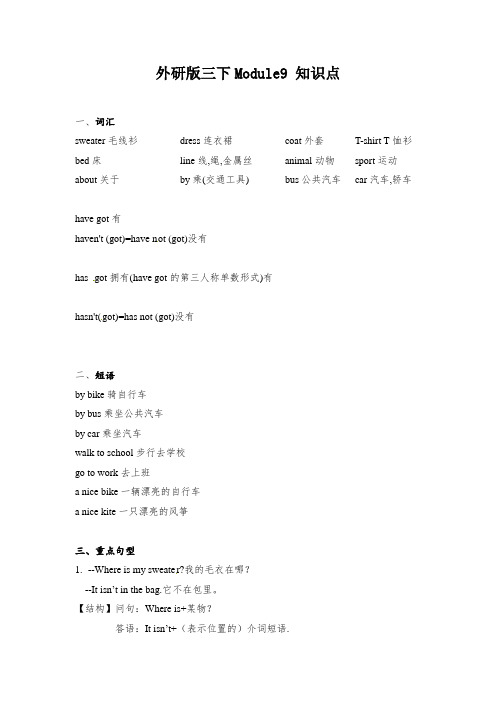
外研版三下Module9 知识点一、词汇sweater毛线衫dress连衣裙coat外套T-shirt T恤衫bed床line线,绳,金属丝animal动物sport运动about关于by乘(交通工具) bus公共汽车car汽车,轿车have got有haven't (got)=have not (got)没有has got拥有(have got的第三人称单数形式)有hasn't(got)=has not (got)没有二、短语by bike骑自行车by bus乘坐公共汽车by car乘坐汽车walk to school步行去学校go to work去上班a nice bike一辆漂亮的自行车a nice kite一只漂亮的风筝三、重点句型1.--Where is my sweate r?我的毛衣在哪?--It isn’t in the bag.它不在包里。
【结构】问句:Where is+某物?答语:It isn’t+(表示位置的)介词短语.【用法】询问某物在哪里Where特殊疑问词,表示“在哪里”,用来询问地点It,它,指示代词,指代上文中提到过的或说话双方都知道的事isn’t=is not例句:--Where is my Chinese book?我的语文书在哪里?--It is not on the desk.它不在桌子上。
2.I’ve got a new book.我有一本新书。
【句型】I’ve got+某物.【用法】介绍自己拥有某物。
I’ve got是I have got的缩写形式,表示“我有”have got=have,表示“有”,后面可直接加名词例句:I have got a birthday gift.我有一个生日礼物。
【拓展】当主语是第三人称单数时,have got要变为has got例句:He has got a new basketball.他有一个新篮球。
外研版三年级下册Module 9

外研版三年级下册Module 9外研版三年级下册的 Module 9 是孩子们英语学习道路上一个重要的组成部分。
这个模块包含了丰富的内容,为孩子们打开了一扇了解世界、学习语言的新窗口。
Module 9 的主题围绕家庭和身体部位展开。
在家庭这个主题下,孩子们会学习到一些关于家庭成员的单词,比如 father(父亲)、mother (母亲)、sister(姐妹)、brother(兄弟)等等。
通过这些单词的学习,孩子们能够更加清晰地描述自己的家庭,增进对家庭的认知和热爱。
在身体部位的学习中,孩子们会接触到head(头)、arm(胳膊)、hand(手)、leg(腿)、foot(脚)等词汇。
这些词汇不仅是语言的学习,也是对自身身体的认识。
老师在教学过程中,会通过各种有趣的方式,让孩子们直观地理解和记住这些单词。
比如,利用图片、实物或者身体动作来展示,让孩子们能够形象地感受和记忆。
在课文部分,Module 9 的内容通常生动有趣,富有生活气息。
课文中的对话和场景往往是孩子们日常生活中熟悉的,比如家庭成员之间的互动,或者小朋友们一起玩耍时对身体部位的描述。
这样的设计能够让孩子们更容易产生共鸣,更好地理解和运用所学的知识。
在语法方面,这个模块可能会涉及到一些简单的形容词性物主代词,如 my(我的)、your(你的)。
通过这些代词的学习,孩子们能够更准确地表达所属关系,使他们的语言表达更加清晰和准确。
为了帮助孩子们更好地掌握 Module 9 的知识,老师们会设计各种各样的教学活动。
课堂上,可能会有小组讨论,让孩子们互相交流自己的家庭成员;也可能会有游戏环节,比如“指身体部位”的游戏,让孩子们在轻松愉快的氛围中巩固所学。
课后的作业也会注重实践和应用。
比如,让孩子们画一幅自己的家庭画像,并标注出家庭成员的英文名称;或者让孩子们用英文描述自己身体的某个部位。
家长们在孩子学习 Module 9 的过程中也能发挥重要的作用。
三年级课文英语课文第九单元义务教育教版
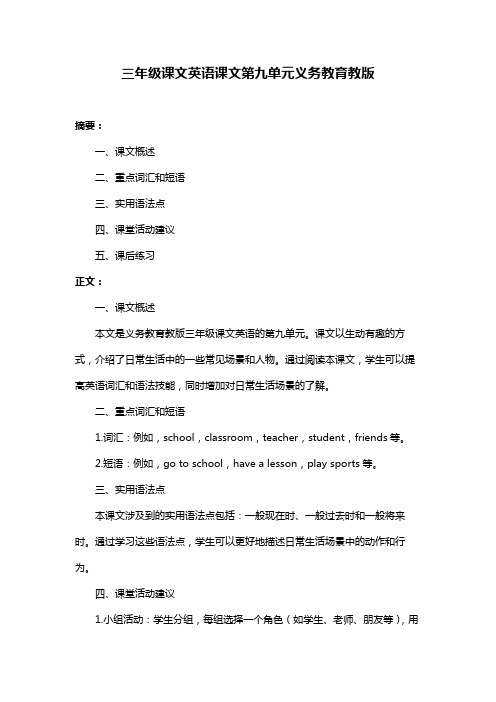
三年级课文英语课文第九单元义务教育教版
摘要:
一、课文概述
二、重点词汇和短语
三、实用语法点
四、课堂活动建议
五、课后练习
正文:
一、课文概述
本文是义务教育教版三年级课文英语的第九单元。
课文以生动有趣的方式,介绍了日常生活中的一些常见场景和人物。
通过阅读本课文,学生可以提高英语词汇和语法技能,同时增加对日常生活场景的了解。
二、重点词汇和短语
1.词汇:例如,school,classroom,teacher,student,friends等。
2.短语:例如,go to school,have a lesson,play sports等。
三、实用语法点
本课文涉及到的实用语法点包括:一般现在时、一般过去时和一般将来时。
通过学习这些语法点,学生可以更好地描述日常生活场景中的动作和行为。
四、课堂活动建议
1.小组活动:学生分组,每组选择一个角色(如学生、老师、朋友等),用
英语表演课文中的场景。
2.图片匹配:教师展示课文中的图片,学生根据图片和课文内容,将图片和相应的句子进行匹配。
3.情景对话:教师创设日常生活场景,学生进行角色扮演,用英语进行对话。
五、课后练习
1.根据课文内容,完成填空题。
2.根据课文情景,编写一段对话。
3.画出你最喜欢的课文场景,并用英语描述。
通过以上课堂活动和课后练习,学生可以更好地掌握本课文的知识点,提高英语实际运用能力。
外研版三年级下册英Module9词汇(课件)

【复数】beds 【短语】 go to bed 上床睡觉 【例句】 My bed is blue.我的床是蓝色的。 【减法记忆】
bedroom 卧室
-
room 房间
=
bed 床
词汇详解
n. (名词) 线,绳,金属丝
【近音词】 lion 狮子 【短语】 on the line 在绳子上 【例句】Look! My cap is on the line.
cats.
词汇详解
n. (名词) 动物
【复数】animals
【例句】My sister likes animals.
我妹妹喜欢动物。 【联想】zoo 动物园 【联想记忆】 animal 动物
tiger 老虎
lion狮子
panda 熊猫
cat 猫
dog 狗
bird鸟
词汇详解
n. (名词) 运动
【用法】 sport作体育运动的总称讲时,是 不可数名词,没有复数形式。
【短语】by car 乘汽车/开车
【例句】 My father goes to work by car.
我爸爸开车上班。
【联想记忆】
car 汽车
bus 公共汽车
bike 自行车
Thanks!
Thanks!
外研版·三年级下册
Module 9
Unit 2 Has Amy got a bike? Part 2
词汇详解
prep. (介词) 乘(交通工具)
【同音词】 bye 再见
【短语】 by bike 骑自行车
【例句】 I go to school by bike.
我骑自行车上学。
【减法记忆】
我有一件蓝色的连衣裙。 【图片记忆】
外研版(三起)-英语-三年级下册--Module 9 重点细归纳
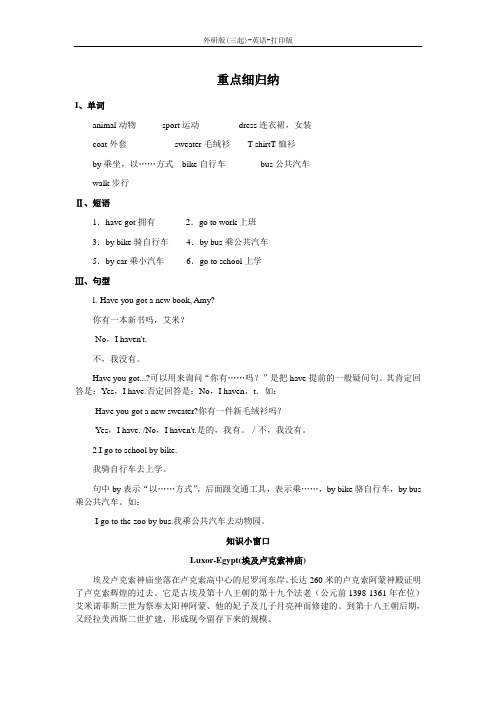
外研版(三起)-英语-打印版重点细归纳I、单词animal动物sport运动dress连衣裙,女装coat外套sweater毛绒衫T-shirtT恤衫by乘坐,以……方式bike自行车bus公共汽车walk步行Ⅱ、短语1.have got拥有2.go to work上班3.by bike骑自行车4.by bus乘公共汽车5.by car乘小汽车6.go to school上学Ⅲ、句型l.-Have you got a new book, Amy?你有一本新书吗,艾米?-No,I haven't.不,我没有。
Have you got...?可以用来询问“你有……吗?”是把have提前的一般疑问句。
其肯定回答是:Yes,I have.否定回答是:No,I haven,t.如:-Have you got a new sweater?你有一件新毛绒衫吗?-Yes,I have. /No,I haven't.是的,我有。
/不,我没有。
2.I go to school by bike.我骑自行车去上学。
句中by表示“以……方式”,后面跟交通工具,表示乘……,by bike骆自行车,by bus 乘公共汽车。
如:-I go to the zoo by bus.我乘公共汽车去动物园。
知识小窗口Luxor-Egypt(埃及卢克索神庙)埃及卢克索神庙坐落在卢克索高中心的尼罗河东岸。
长达260米的卢克索阿蒙神殿证明了卢克索辉煌的过去。
它是古埃及第十八王朝的第十九个法老(公元前1398-1361年在位)艾米诺菲斯三世为祭奉太阳神阿蒙、他的妃子及儿子月亮神而修建的。
到第十八王朝后期,又经拉美西斯二世扩建,形成现今留存下来的规模。
小学英语三年级下册第九模块《学习要点》
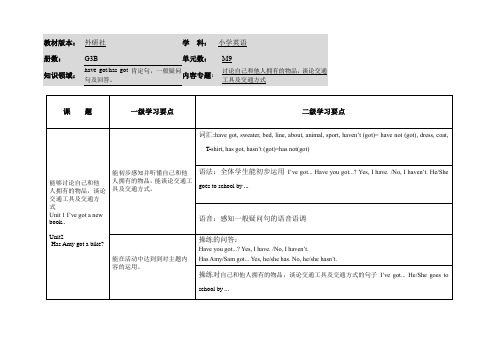
外研社
学科:小学英语
册数:
G3B
单元数:
M9
知识领域:
have got/has got肯定句,一般疑问句及回答。
内容专题:
讨论自己和他人拥有的物品,谈论交通工具及交通方式
课题
一级学习要点
二级学习要点
能够讨论自己和他人拥有的物品,谈论交通工具及交通方式
Unit 1 I’ve got a new book..
Has Amy/Sam got... Yes, he/she has. No, he/she hasn’t.
操练对自己和他人拥有的物品,谈论交通工具及交通方式的句子I’ve got... He/She goes to school by ...
学会自主交流自己和他人拥有的物品,谈论交通工具及交通方式。
Unit2
Has Amy got a bike?
能初步感知并听懂自己和他人拥有的物品,能谈论交通工具及交通方式。
词汇:have got, sweater, bed, line, about, animal, sport, haven’t (got)= have not (got), dress, coat, T-shirt, has got, hasn’t (got)=has not(got)
语法:全体学生能初步运用I’ve got... Have you got...? Yes, I have. /No, I haven’t. He/She goes to school by ...
语音:感知一般疑问句的语音语调
能在活动...? Yes, I have. /No, I haven’t.
三年级下车英语第九模块
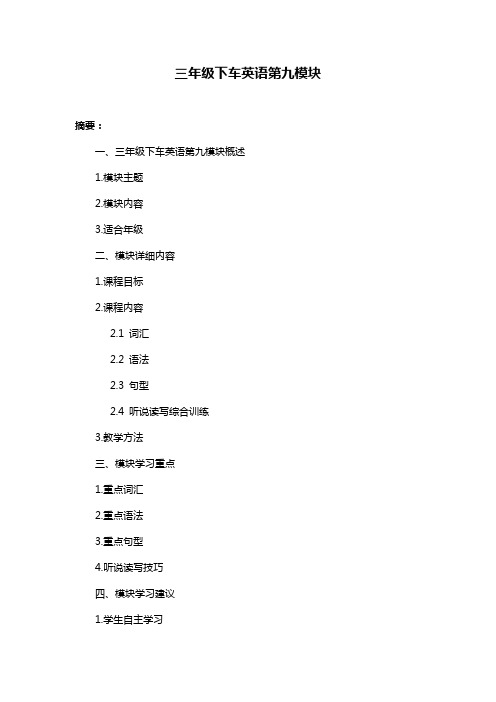
三年级下车英语第九模块摘要:一、三年级下车英语第九模块概述1.模块主题2.模块内容3.适合年级二、模块详细内容1.课程目标2.课程内容2.1 词汇2.2 语法2.3 句型2.4 听说读写综合训练3.教学方法三、模块学习重点1.重点词汇2.重点语法3.重点句型4.听说读写技巧四、模块学习建议1.学生自主学习2.课堂互动学习3.家庭作业与复习4.家长辅助学习正文:【三年级下车英语第九模块】一、三年级下车英语第九模块概述三年级下车英语第九模块是一个针对三年级学生的英语学习模块。
本模块以生动有趣的主题为核心,通过丰富的课程内容,帮助学生巩固和提高英语基础能力。
二、模块详细内容1.课程目标本模块旨在帮助学生掌握一定数量的常用词汇、语法和句型,提高学生的听说读写综合能力,激发学生学习英语的兴趣。
2.课程内容2.1 词汇本模块包含一系列与主题相关的词汇,如动物、颜色、数字等。
学生通过学习这些词汇,能够丰富自己的词汇量,并在实际生活中进行运用。
2.2 语法本模块涉及一些基本的语法知识点,如名词、动词、形容词等词性的用法,以及简单句子的构成。
学生通过学习语法知识,能够更好地理解和掌握英语表达。
2.3 句型本模块提供了一些常用的英语句型,如问候、介绍、道别等。
学生通过模仿和运用这些句型,能够提高自己的英语交流能力。
2.4 听说读写综合训练本模块通过各种形式的听说读写练习,如对话、故事、歌曲等,让学生在实际情境中运用所学知识,提高英语综合能力。
3.教学方法本模块采用情境教学法、任务型教学法和游戏教学法等多种教学方法,让学生在轻松愉快的氛围中学习英语。
三、模块学习重点1.重点词汇本模块中的动物、颜色、数字等词汇是学习的重点,学生应熟练掌握并能在实际情境中运用。
2.重点语法名词、动词、形容词等词性的用法以及简单句子的构成是本模块的学习重点,学生需要理解并运用这些语法知识。
3.重点句型问候、介绍、道别等常用句型是本模块的学习重点,学生应熟练掌握并能在实际交流中运用。
- 1、下载文档前请自行甄别文档内容的完整性,平台不提供额外的编辑、内容补充、找答案等附加服务。
- 2、"仅部分预览"的文档,不可在线预览部分如存在完整性等问题,可反馈申请退款(可完整预览的文档不适用该条件!)。
- 3、如文档侵犯您的权益,请联系客服反馈,我们会尽快为您处理(人工客服工作时间:9:00-18:30)。
Module 9知识要点
词汇:1.tomorrow 2.take 3.why 4.day 5.after 6.Tuesday
7.Wendesday 8.Thursday 9.Monday
短语:
带着风筝去野餐
4. a good idea一个好主意
5. after Tuesday星期二之后
句型:
1. Tomorrow is Friday.
明天是星期五。
2. Will you take your kite to the picnic tomorrow?明天你会带着你的风筝去野餐吗?
3. No, I won’t .
不,我不会。
4. Will you take your ball tomorrow?
你明天会带着你的球吗?
5. Yes,I will .
是的,我会。
6. He will sleep on Sunday.
星期日他会睡懒觉。
7. What day is after Tuesday? 星期二之后是星期几?
8. It’s Wednesday.
是星期三。
隐性语法:1、一般将来时。
2、一周七天的表达:能正确听、说、读、写一周里的七天。
3、能够使用英语询问并回答今天星期几?
Module 9 基础检测姓名:
一、写出下列单词:
二、写出下列短语:
1、在星期六
2、野餐
3、带着风筝去野餐
4、一个好主意
5、星期二之后
三、写出下列句子:
1. 明天是星期五。
2. 明天你会带着你的风筝去野餐吗?
3. 不,我不会。
4. 你明天会带着你的球吗?
5. 是的,我会。
6. 星期日他会睡懒觉。
7. 星期二之后是星期几?
8. 是星期三。
